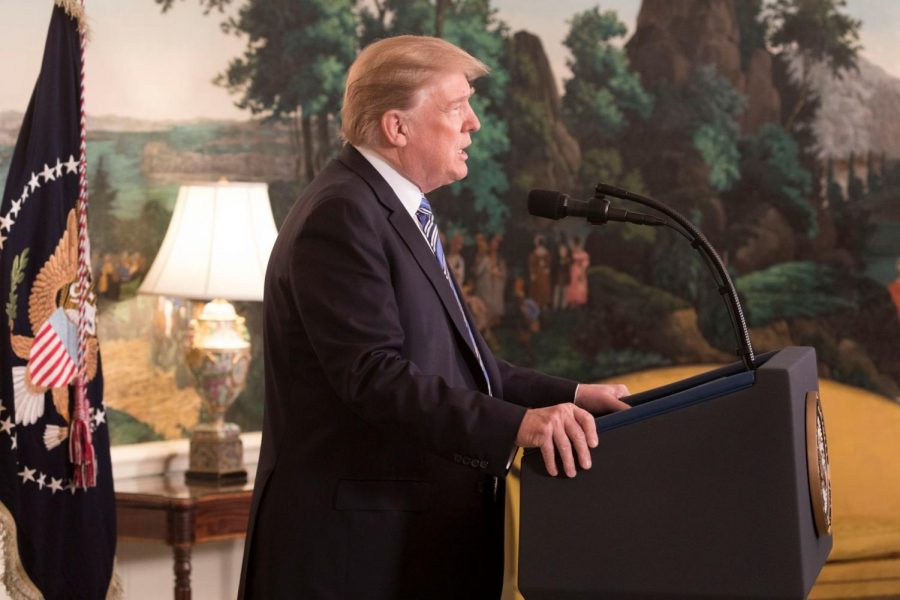Government Shutdown Continues as Debates Come to a Standstill
January 11, 2019
In a rare live broadcast from the Oval Office on Jan. 9, President Trump appealed for support of the wall he has been fighting for since the start of his campaign. Highlighting his long-held concerns of border security and illegal immigration, he makes a case for funding his wall and ending the current government shutdown that has lasted 20 days, 1 day away from becoming the most prolonged shutdown in U.S. history. His speech was the first Presidential speech since the Bush Administration to be broadcasted on every popular network.
Following the televised message, President Trump then attempted to have talks with Democratic leaders. However, these talks quickly came to a close, as President Trump walked out of the meeting a mere 20 minutes in when Speaker Nancy Pelosi stated that she would not approve border wall funding if the government shutdown comes to an end. With no released information regarding further negotiations, close to 380,000 government workers are currently being held financially hostage as they and their families try to survive the weeks without pay.
The shutdown first began after a standstill in debates over border wall funding between President Trump and Democrats. Both sides would not give on their demands, with President Trump refusing to back down, and Democrats being unwilling to approve the change to the funding legislation. With the previous government spending period ending on Dec. 21, there was no choice but to go into a government shutdown starting on Dec. 22. In his televised address, President Trump pleaded for change, stating that “all Americans are hurt by uncontrolled illegal migration.” However, many Democrats say that the shutdown has only harmed working class citizens, with some Republicans even agreeing it has gone on for far too long. Despite these concerns, President Trump has stated that he is prepared for this shutdown to last months or even years. However, government workers and those who benefit from them are starting to struggle, with Coast Guard families being suggested to have garage sales and do odd jobs to survive, and Native American reservations losing access to plows to remove snow on the roads, which cost a tribal member’s life.
“A border wall will actually not do very much for security in the long run, and I don’t think it’s needed,” Sonny Stenson ‘20 said. “Our national parks are falling out of repair since the government can’t afford to pay them. The impact it’s having on our stock market with businesses being unable to request the financial capital that they need is having a negative effect in general. I think Democrats should try to reach a compromise with Trump over border security, but not give in to giving him the 5.7 million dollars.”
With talks coming to a standstill, President Trump says he might declare a national emergency to allocate funds towards building the wall. In preparation of building the wall, the Pentagon has collected a list of unspent funds that would be used, such as the money being used to fund disaster relief projects in Texas, California, Puerto Rico, and many more states. He also visited the Texas border on Jan. 10 to meet with officials about the wall’s construction, which could start within 45 days of his emergency declaration, if it occurs.
“I think there are much better ways of enforcing border security on the Mexican border,” Anurima Mummaneni ’20 said. “There are several ways to achieve something similar to what Trump wants to be done without spending billions and billions of dollars on the border wall. I absolutely disagree with the notion of extending the government shutdown to leverage against the Democrats to fund his border wall, which I think is a waste of government funds as well. I know that it won’t happen, but I think that President Trump should be the one to step down in the interest of preserving the sanctity of his own government and the jobs of hundreds of thousands of Americans.”
Although currently only government workers have been furloughed, contractors and those who work in ancillary jobs, such as daycares, may be next to lose their jobs if the shutdown continues until the end of the month. The TSA has stopped fully inspecting passengers going onto airplanes, and the FDA has also stopped some inspections of foods, endangering the safety of American citizens. Immigrants courts are also backlogged, causing people to be rescheduled for court dates years from now. As uncertainty grows, only time will tell how much more overwhelmed the population and the government will become.




Sal Guavo • Jan 17, 2019 at 4:08 pm
I agree with Daniel Chen! I think it would be interesting to see both sides of the argument.
Daniel Chen • Jan 15, 2019 at 8:18 am
I would be interested in seeing quotes from students on the other side of the aisle, and not just those that support a single agenda. Thanks.